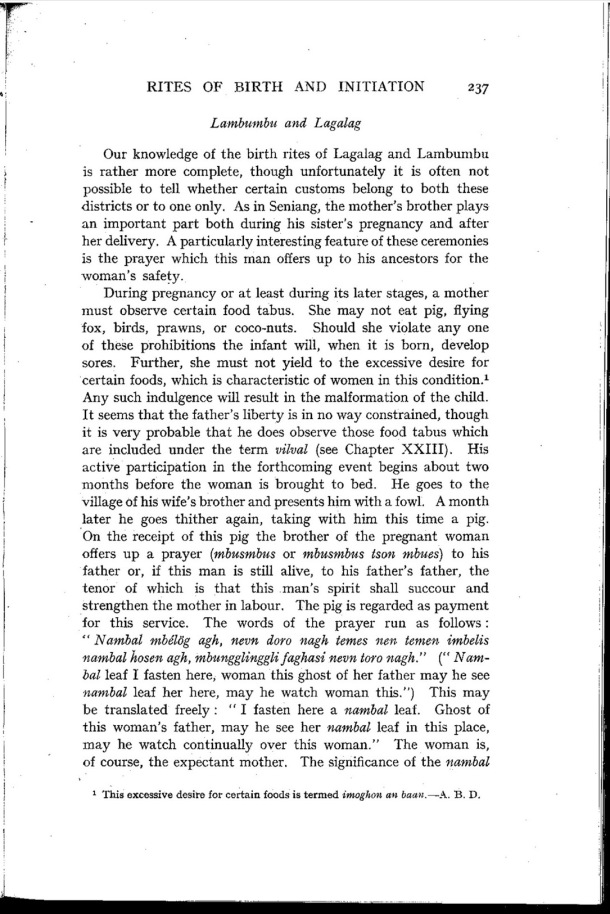|
|  [Note: this transcription was produced by an automatic OCR engine]
=
>
1‘
RITES OF BIRTH AND INITIATION 237
Lumbumb-u and Lagalag
Our knowledge of the birth rites of Lagalag and Lambumbu
is rather more complete, though unfortunately it is often not
possible to tell whether certain customs belong to both these
districts or to one only. As in Seniang, the mother’s brother plays
an important part both during his sister's pregnancy and after
her delivery. A particularly interesting feature of these ceremonies
is the prayer which this man offers up to his ancestors for the
woman's safety.
During pregnancy or at least during its later stages, a mother
must observe certain food tabus. She may not eat pig, flying
fox, birds, prawns, or coco-nuts. Should she violate any one
of these prohibitions the infant will, when it is born, develop
sores. Further, she must not yield to the excessive desire for
certain foods, which is characteristic of women in this condition.‘
Any such indulgence will result in the malformation of the child.
It seems that the father's liberty is in no way constrained, though
it is very probable that he does observe those food tabus which
are included under the term mil:/al (see Chapter XXIII). His
active participation in the forthcoming event begins about two
months before the woman is brought to bed. He goes to the
village of his wife's brother and presents him with a fowl. A month
later he goes thither again, taking with him this time a pig.
‘On the receipt of this pig the brother of the pregnant woman
offers up a prayer (mbusmbus or mbumbus tsmz mlmes) to his
father or, if this man is still alive, to his father's father, the
tenor of which is that this man's spirit shall succour and
strengthen the mother in labour. The pig is regarded as payment
for this service. The words of the prayer run as follows:
“ Nambal mbélï¬Åg ugh, nerm dare nagh frames new temen imbelis
mlmbal liosm agh, mbimgglingglifaghasi mun taro nagh/’ (“ N am-
bal leaf I fasten here, woman this ghost of her father may he see
mzmbal leaf her here, may he watch woman thisâ€ù) This may
be translated freely: " I fasten here a nambal leaf. Ghost of
this woman’s father, may he see her nambal leaf in this place,
may he Watch continually over this woman." The woman is,
of course, the expectant mother. The signiï¬Åcance of the nambal
‘ This excemive desire for certain foods is termed dmnglnm an bnun.~.-. B. D.
|